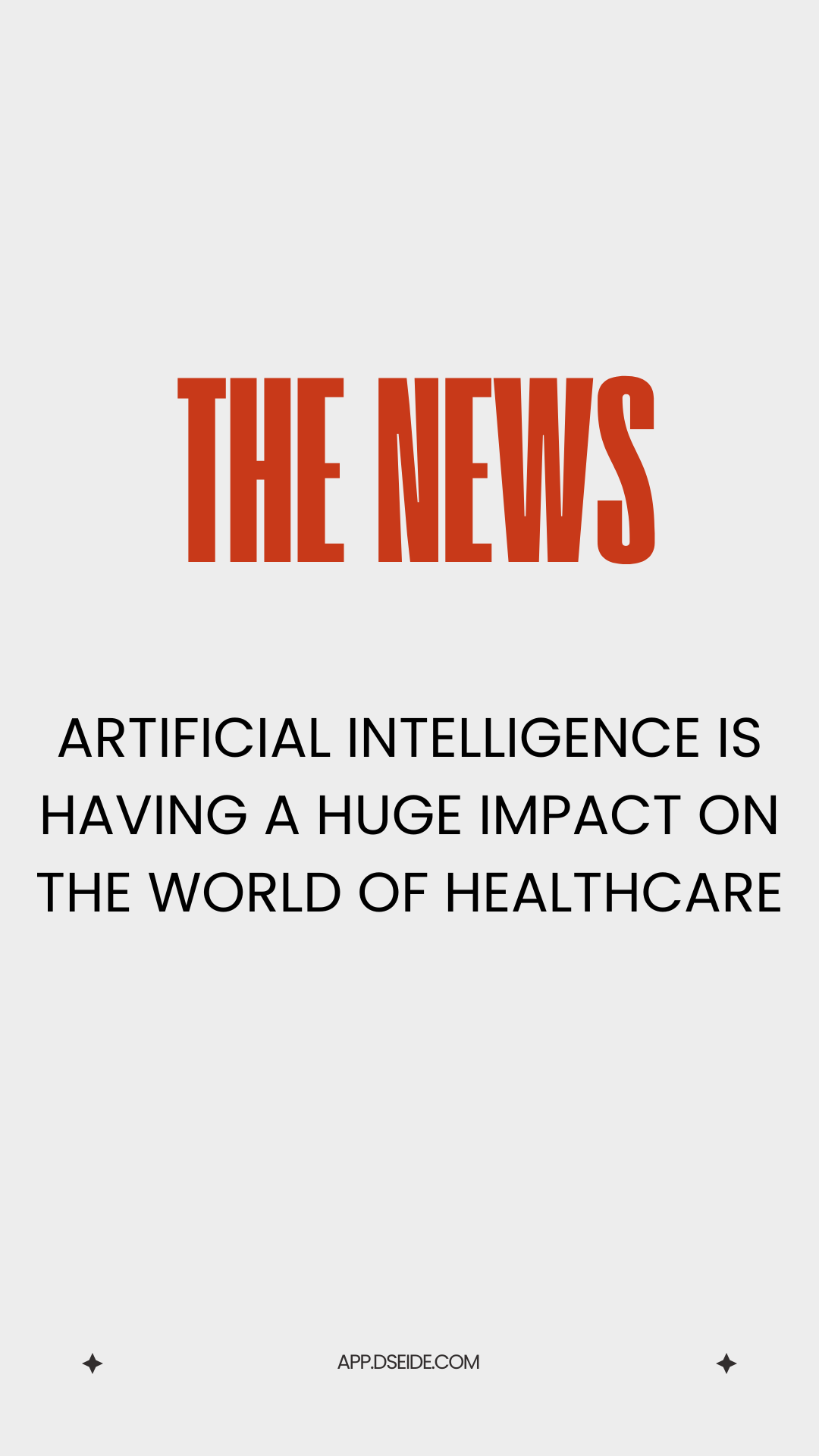The Transformative Impact of Artificial Intelligence in Healthcare
Artificial Intelligence (AI) is revolutionizing the healthcare industry, bringing innovative solutions to patient care, diagnostics, drug development, and hospital management. The integration of AI in healthcare is not only enhancing efficiency but also improving accuracy and patient outcomes.
1. AI in Diagnostics and Medical Imaging
One of the most significant applications of AI in healthcare is in diagnostics and medical imaging. AI-powered tools can analyze medical images, such as X-rays, MRIs, and CT scans, with remarkable accuracy. Deep learning models, particularly convolutional neural networks (CNNs), have demonstrated exceptional performance in detecting diseases like cancer, pneumonia, and retinal disorders. AI-driven diagnostic tools help radiologists identify abnormalities faster, leading to early detection and timely intervention.
2. AI in Drug Discovery and Development
AI is accelerating drug discovery by analyzing complex biological data and predicting potential drug candidates. Traditional drug development processes can take years and cost billions of dollars, but AI-driven models can identify promising compounds in a fraction of the time. AI is also playing a crucial role in personalized medicine by analyzing genetic data to predict patient responses to specific treatments, thereby enhancing the efficacy of therapies.
3. AI in Patient Care and Virtual Assistants
AI-powered chatbots and virtual assistants are transforming patient engagement by providing instant medical advice, scheduling appointments, and monitoring chronic conditions. These tools can analyze patient symptoms and recommend appropriate actions, reducing the burden on healthcare professionals and ensuring timely interventions. AI-driven wearable devices can also track vital signs and alert doctors in case of any abnormalities.
4. AI in Robotic Surgery
Robotic-assisted surgeries, powered by AI, are improving surgical precision and reducing risks. AI enables robotic systems to perform minimally invasive procedures with greater accuracy, leading to shorter recovery times and improved patient outcomes. Surgeons can leverage AI-powered robots for delicate procedures, such as neurosurgery and orthopedic surgery, ensuring higher success rates.
5. AI in Healthcare Administration
AI is streamlining administrative tasks in hospitals and healthcare facilities, reducing paperwork and enhancing efficiency. AI-driven systems can automate billing, insurance claims processing, and patient record management, allowing healthcare providers to focus more on patient care. Predictive analytics can also optimize hospital resource allocation by forecasting patient admissions and managing staff schedules effectively.
6. AI in Predictive Analytics and Disease Prevention
AI models can analyze vast amounts of healthcare data to predict disease outbreaks and identify at-risk populations. Machine learning algorithms assess electronic health records (EHRs) and lifestyle data to detect early signs of chronic diseases, such as diabetes and cardiovascular disorders. Preventive healthcare powered by AI helps in reducing hospitalizations and improving public health outcomes.
Challenges and Ethical Considerations
Despite its immense potential, AI in healthcare faces challenges, including data privacy concerns, bias in AI algorithms, and regulatory hurdles. Ensuring transparency and ethical use of AI is crucial to gaining trust among healthcare professionals and patients. Additionally, continuous monitoring and validation of AI models are necessary to ensure their accuracy and reliability.
Conclusion
Artificial Intelligence is reshaping the future of healthcare, offering advanced solutions for diagnostics, drug discovery, patient care, and hospital management. As AI technology continues to evolve, it has the potential to create a more efficient, accessible, and personalized healthcare system. However, addressing ethical challenges and ensuring responsible AI deployment will be key to maximizing its benefits while minimizing risks.
SOURCE- telefonica
#AI #Healthcare, #AIinHealthcare #Medtech
The Transformative Impact of Artificial Intelligence in Healthcare
Artificial Intelligence (AI) is revolutionizing the healthcare industry, bringing innovative solutions to patient care, diagnostics, drug development, and hospital management. The integration of AI in healthcare is not only enhancing efficiency but also improving accuracy and patient outcomes.
1. AI in Diagnostics and Medical Imaging
One of the most significant applications of AI in healthcare is in diagnostics and medical imaging. AI-powered tools can analyze medical images, such as X-rays, MRIs, and CT scans, with remarkable accuracy. Deep learning models, particularly convolutional neural networks (CNNs), have demonstrated exceptional performance in detecting diseases like cancer, pneumonia, and retinal disorders. AI-driven diagnostic tools help radiologists identify abnormalities faster, leading to early detection and timely intervention.
2. AI in Drug Discovery and Development
AI is accelerating drug discovery by analyzing complex biological data and predicting potential drug candidates. Traditional drug development processes can take years and cost billions of dollars, but AI-driven models can identify promising compounds in a fraction of the time. AI is also playing a crucial role in personalized medicine by analyzing genetic data to predict patient responses to specific treatments, thereby enhancing the efficacy of therapies.
3. AI in Patient Care and Virtual Assistants
AI-powered chatbots and virtual assistants are transforming patient engagement by providing instant medical advice, scheduling appointments, and monitoring chronic conditions. These tools can analyze patient symptoms and recommend appropriate actions, reducing the burden on healthcare professionals and ensuring timely interventions. AI-driven wearable devices can also track vital signs and alert doctors in case of any abnormalities.
4. AI in Robotic Surgery
Robotic-assisted surgeries, powered by AI, are improving surgical precision and reducing risks. AI enables robotic systems to perform minimally invasive procedures with greater accuracy, leading to shorter recovery times and improved patient outcomes. Surgeons can leverage AI-powered robots for delicate procedures, such as neurosurgery and orthopedic surgery, ensuring higher success rates.
5. AI in Healthcare Administration
AI is streamlining administrative tasks in hospitals and healthcare facilities, reducing paperwork and enhancing efficiency. AI-driven systems can automate billing, insurance claims processing, and patient record management, allowing healthcare providers to focus more on patient care. Predictive analytics can also optimize hospital resource allocation by forecasting patient admissions and managing staff schedules effectively.
6. AI in Predictive Analytics and Disease Prevention
AI models can analyze vast amounts of healthcare data to predict disease outbreaks and identify at-risk populations. Machine learning algorithms assess electronic health records (EHRs) and lifestyle data to detect early signs of chronic diseases, such as diabetes and cardiovascular disorders. Preventive healthcare powered by AI helps in reducing hospitalizations and improving public health outcomes.
Challenges and Ethical Considerations
Despite its immense potential, AI in healthcare faces challenges, including data privacy concerns, bias in AI algorithms, and regulatory hurdles. Ensuring transparency and ethical use of AI is crucial to gaining trust among healthcare professionals and patients. Additionally, continuous monitoring and validation of AI models are necessary to ensure their accuracy and reliability.
Conclusion
Artificial Intelligence is reshaping the future of healthcare, offering advanced solutions for diagnostics, drug discovery, patient care, and hospital management. As AI technology continues to evolve, it has the potential to create a more efficient, accessible, and personalized healthcare system. However, addressing ethical challenges and ensuring responsible AI deployment will be key to maximizing its benefits while minimizing risks.
SOURCE- telefonica
#AI #Healthcare, #AIinHealthcare #Medtech





